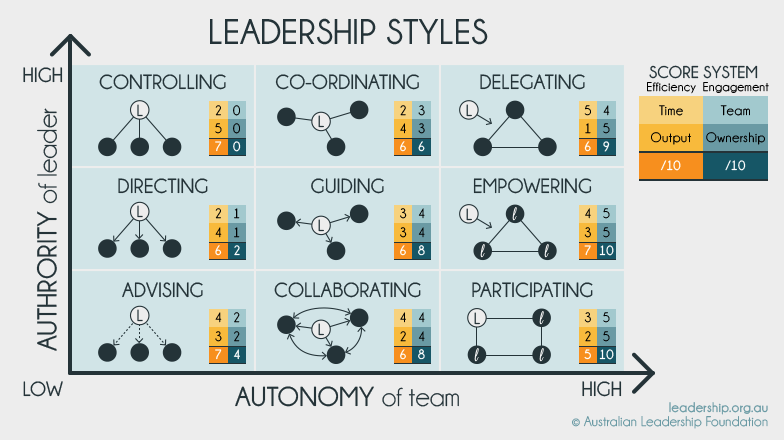SESSION 19 | ORGANIZATIONAL LEADERSHIP MODELS
There are a number of different theories of leadership. We will consider a few and identify how we fit into their definitions.
Start by watching a discussion on leadership being a choice
back to top
Then read this one

to prepare yourselves for the session
take the What's Your Leadership Style? quiz and come prepared to discuss your results
back to top
You don't have to read these unless you wish to, but we might touch upon them in conversation

Rooke, D., & Torbert, W. R. (2005, Apr). 7 transformations of leadership. Harvard Business Review, 66-76.
Most developmental psychologists agree that what differentiates one leader from another is not so much philosophy of leadership, personality, or style of management. Rather, it's internal "action logic"--how a leader interprets the surroundings and reacts when his or her power or safety is challenged. Relatively few leaders, however, try to understand their action logic, and fewer still have explored the possibility of changing it.
They should, because leaders who undertake this voyage of personal understanding and development can transform not only their own capabilities but also those of their companies. The authors draw on 25 years of consulting experience and collaboration with psychologist Susanne Cook-Greuter to present a typology of leadership based on the way managers personally make sense of the world around them. Rooke and Torbert classify leaders into seven distinct action/logic categories:
- Opportunists,
- Diplomats,
- Experts,
- Achievers,
- Individualists,
- Strategists, and
- Alchemists
- the first three associated with below-average performance, the latter four with medium to high performance.
These leadership styles are not fixed, the authors say, and executives who are willing to work at developing themselves and becoming more self-aware can almost certainly move toward one of the more effective action logics. A Diplomat, for instance, can succeed through hard work and self-reflection at transforming himself into a Strategist. Few people may become Alchemists, but many will have the desire and potential to become Individualists and Strategists. Corporations that help their executives and leadership teams to examine their action logics can reap rich rewards.
back to top
things we'll talk about
- we'll consider leadership functions within organizational structures. contrast the difference between the three Lewin styles and the multiple Rooke and Torbert styles.
- what are the strengths and weaknesses of the different leadership styles?
- plan to discuss the impact of leadership on the success and/or failure of organizations
- can an organization be successful without inspirational leadership? if so, how? if not, why?
